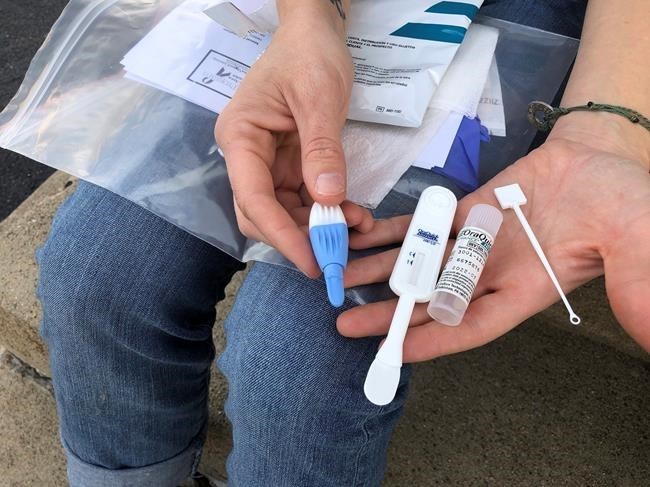
FILE - In this Tuesday, March 9, 2021 file photo, Solutions Oriented Addiction Response organizer Brooke Parker displays an HIV testing kit in Charleston, W.Va. The nonprofit group operates health fairs for residents, including syringe exchanges and HIV testing. On Monday, April 5, 2021, U.S. Sen. Joe Manchin, R-W.Va., submitted a congressional inquiry with the Centers for Disease Control and Prevention regarding an HIV outbreak in West Virginia's largest county, two months after a CDC official warned that Kanawha county's outbreak was “the most concerning in the United States.” (AP Photo/John Raby)
Republished April 10, 2021 - 8:42 PM
Original Publication Date April 10, 2021 - 10:45 AM
CHARLESTON, W.Va. - A West Virginia bill that would regulate needle exchange programs gained final approval in the Republican-controlled legislature on Saturday amid a spike in HIV cases in the state.
Critics have said its more stringent requirements for the programs will constrain the number of providers who give clean syringes to injection drug users not able to quit the habit. The legislation would also require participants show an identification card to get a syringe.
Supporters said the legislation would help those addicted to opioids get connected to health care services fighting substance abuse.
Republican Gov. Jim Justice told reporters late Saturday before it won final passage in the House of Delegates that he supported the legislation.
Republicans backing the bill said the changes were necessary due to some needle exchange programs “operating so irresponsibly” that they were causing syringe litter.
Democrats slammed the legislation before the House voted 67-32 to send it to the governor.
“We are really going to regret this. There are going to be people that are going to die,” said Democratic Del. Barbara Fleischauer. “A good needle exchange program opens the door for recovery. And we are going to be shutting that door.”
The new rules would take effect amid one of the nation's highest spikes in HIV cases related to intravenous drug use.
The surge, clustered primarily around the capital of Charleston and the city of Huntington, is being attributed at least in part to the cancellation in 2018 of a needle exchange program.
City leaders and first responders complained that the program in Kanawha County led to an increase in needles being left in public places and abandoned buildings, and it was shut down.
The Centers for Disease Control and Prevention describes syringe programs as “safe, effective, and cost-saving.”
U.S. Sen. Joe Manchin on Monday submitted a congressional inquiry with the CDC regarding the county's HIV outbreak.
The West Virginia Democrat asked for the inquiry on behalf of the Kanawha County Commission two months after a CDC official warned that the county’s outbreak was “the most concerning in the United States.”
The legislation would require licenses for syringe collection and distribution programs. Operators would have to offer an array of health outreach services, including overdose prevention education and substance abuse treatment program referrals.
Republican Sen. Mike Maroney said those “wraparound services” are the most important part of the bill.
Opponents say the bill’s stringent measures would force existing exchange programs to close. Democratic Sen. Ron Stollings called it a “knee jerk reaction to needle litter.”
One provision would give local governments the authority to bar certain groups or providers from setting up a needle exchange program.
When it comes to the requirement for needle exchange programs to provide healthcare services, Republican Senate Majority Leader Tom Takubo said needle providers can partner with other organizations providing health outreach services in order to comply with the law.
Another provision would require syringes to be marked with the program passing them out. Takubo said that could help settle once-and-for-all the question of whether exchanges lead to litter.
“We've really compromised,” Justice said at a news conference. “We've got now a situation where we have people who can dispense this through a registration process, and ... we won't hopefully have needles just laying around all over the place.”
____
This story was corrected early Saturday afternoon to reflect that the bill at that time had not yet passed the full legislature. In the evening, it gained final approval from the legislature and will be sent to the governor.
News from © The Associated Press, 2021